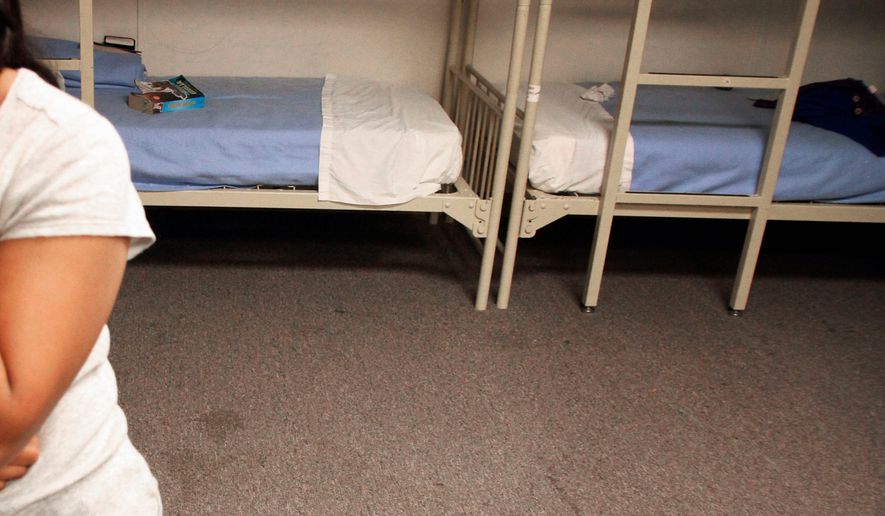Federal judges in the District of Columbia and California are grappling with a thorny legal issue testing the limits of religious freedom and abortion rights involving pregnant illegal immigrants held at government-funded shelters, some of which are run by pro-life religious charities.
The young women in many cases have survived harrowing journeys north, some of them pregnant from being raped along the way. They arrived at the U.S. border as unaccompanied alien children and are entitled under law to special treatment, including medical care.
In the case of pregnant girls, that medical care can mean abortion — sometimes at taxpayer expense — causing a clash with shelters run by Catholic Charities and other religious nonprofits that don’t want to be complicit in abortions but contract with the federal government to provide shelter and receive grants.
Recognizing those concerns, the federal government wrote contracts to allow the charities to avoid complicity, but the American Civil Liberties Union says that leaves girls without access to reproductive services, including abortion, to which they have a right.
The ACLU has filed a lawsuit saying either the nonprofits must cooperate in all care, including abortion, or the government needs to find other contractors that will.
“The federal government is legally required to provide these young people with basic necessities, such as housing, food, and access to emergency and routine medical care, including family planning services, post-sexual assault care, and abortion,” the ACLU says in the lawsuit, filed last year and updated this year.
It’s the latest issue with unaccompanied minors at the border pressing the limits of federal law.
Under current policy, children apprehended at the border who are traveling without a parent have to be processed quickly and turned over to Health and Human Services Department social workers — unless they are Mexican or Canadian.
Once in HHS care, they are farmed out to shelters, where they are kept until they can be placed with sponsors in the U.S. — often parents living in the country illegally.
HHS contracts out to dozens of shelters nationwide, and the minors are given highly regimented treatment including access to culturally sensitive music, special meals for the lactose-intolerant, and lavish playgrounds and schooling, The Washington Times reported in 2014.
They also get health care. For some, it’s the first time in their lives that they have seen a dentist or doctor.
For pregnant girls, that can mean the need for reproductive health care, including abortion. That creates a tricky situation for HHS and religiously motivated shelters that are among the contractors.
“The administration is putting itself in a difficult position,” said Robert Tuttle, a law professor at George Washington University. “It’s right in some sense or another that the organization has tried to stay out of the limelight in this because it doesn’t want to portray itself as the instrument of the right wing of policy from the Vatican’s perspective. On the other hand, in some respect, they are the one that is caught there.”
In addition to the ACLU’s California lawsuit, the organization went to court in the District of Columbia on Friday with a case involving a pregnant minor being kept in a federally funded shelter in Brownsville, Texas. The girl is seeking an abortion.
Under Texas law, a minor must have a parent’s consent or judicial waiver in order to obtain an abortion. The girl in Texas went to court and obtained a judicial waiver, but the shelter prevented her from being transported to the clinic for an abortion, the ACLU said.
“The Trump administration’s action is shocking: A young woman is essentially being held hostage and forced by federal officials to continue a pregnancy against her will,” said Brigitte Amiri, an attorney with the ACLU. “And this case isn’t the only one. Nationally, the federal government is obstructing young immigrant women’s access to abortion. It’s blatantly unconstitutional, not to mention unconscionable.”
HHS said its “paramount concern is the child’s safety and well-being.”
“In this specific case, we are providing excellent care to the adolescent girl and her unborn child, who remain under our care until the mother’s release,” the agency said in a statement to The Washington Times.
It’s not clear what shelter is involved in the Texas case.
The government shells out hundreds of millions of dollars to care for the children. In June, HHS announced a $110.5 million extension of 48 contracts to accommodate the spike in unaccompanied minors coming to the U.S. in 2016.
In the ACLU’s lawsuit filed in federal court in California, the U.S. Conference of Catholic Bishops has intervened. It is siding with the administration to defend the contracts that allow for objections to abortion services.
The conference didn’t respond to multiple requests for comment about the special accommodations, but a lawyer representing the bishops declined to comment.
The challenge to abortion services is part of a series of lawsuits testing tax dollars going to faith-run organizations that perform actions on behalf of the government. Last month, the ACLU sued the state of Michigan for working with Christian adoption services that won’t permit same-sex couples to foster or adopt children.
“The right of religious liberty, which for some reason is perceived to be under attack is going to prevail over inconsistent governmental policy, and it’s not just in this area — it’s three or four other areas where there are conflicts over [grants] to Catholic agencies that are involved in some form of either immigration work or health care or other things,” Mr. Tuttle said.
The federal government contends the Constitution’s establishment clause is not violated when religious organizations receive government contracts to supply temporary housing for undocumented immigrants.
“The government creates religious accommodations all the time,” said Eric Rassbach, an attorney for the Becket Fund for Religious Liberty, which often represents religious organizations, though it is not involved in the current case.
• Alex Swoyer can be reached at aswoyer@washingtontimes.com.




Please read our comment policy before commenting.